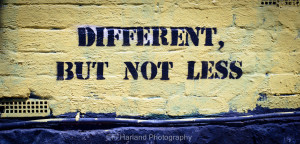![]()

It used to be, say in 2008, parent bloggers could write – without experiencing any backlash – about the challenges of raising an autistic child. Soon, though, we were chastised for saying “autistic” – we were told to say “with autism.” We had to use person-first language, even if we could clearly see that autism affected every area of our child’s development, every facet of his identity, not just how he communicated and interacted socially (or tried to), but the way he thought.
There are others who posited that the difference between “autistic vs. with autism” was mere semantics. The issue turned into a feud that I don’t think has ever been laid to rest. Many haven’t agreed to disagree. Some, myself included, believe that parents should refer to their own child in their chosen way without being criticized. We’ve all heard “you know your child best,” and I wholeheartedly agree.
And now in some circles we are being rebuked for even writing about the parental challenges we have faced. Our children are the ones who experience the challenges – no parent would deny that. But parents of non-autistic kids write about parental challenges they face. Why is it frowned upon for parents of autistic kids to write about their struggles with providing the best life possible for their children, and the trials along the way?
I’m not talking about complainers, blamers, or haters. I’m talking about loving parents who want to connect with other parents who walk the same path. Who hope, through their writing, to continue to debunk the myths and eradicate ignorance.
They do talk about the struggles, the monumental challenges their children have faced. They talk about their children’s determination to learn to communicate or to filter the sensory input that prevented them from doing things they – the children – wanted to do. They say things like, “He’s come a long way.” And that’s the latest criticism – that they had to “come a long way” to therapy-out their different-ness. (Part of me understands where the nay-sayers are coming from – I really do, and I’ve written about that topic before.)
She’s come a long way.
I say that about my happily-introverted self after I spent a year and a half training to teach two-day workshops for my job. It was agony, and I cried a lot during the process. I am now certified to teach the workshops and I no longer have panic attacks. I’ve always been happy being an introvert – and still am – but I’ve come a long way so I can do the job I love.
I say that about my non-autistic son when he overcomes something that was particularly challenging. His own sensory issues prevented him from riding a bike until his teens, which he now does avidly. He became a voracious reader after having experienced a good amount of difficulty in learning to do so, and he kept trying.
He’s come a long way.
And I say that about my extroverted autistic son when he began communicating by using wooden letter blocks to spell out words and, years later, can have a spoken conversation. I said that when he tried to be social at the playground – because he wanted to – and sadly alienated all the kids. And so many other things he worked hard to achieve – because he wanted to do them, and he didn’t want his different-ness to prevent him from doing so.
Now, I proudly tell people that he’s in a supported living program in his own apartment. I honestly can’t find anything questionable about saying that my son has come a long way. In the validating words of Temple Grandin, my son is “different, but not less” and has proven it over and over again.

I agree with you. I am walking on egg sheels 24/7 – careful how I speak to my son, waiting for the right moment to ask a simple question. He is 17.
So having to be ever so careful when trying to talk to other parents is just exhausting. One facebook site had lots of unpleasant comments.
Friends and family do not “get it” when I say the issues are relentless and tell me to “stop caring” for my own sake – which I cannot.
So yes I would like a place to talk about what it is like to parent my child… not necessarily about HIM but how I feel and wonder whether there are teens on the spectrum like him.
Thank you.
I think what you say about “you know your child best” is really the final judgment. If anyone else tries to tell you what you can say about him, or how you ‘should’ say it, they are, to put a Big Lebowski spin on it, out of their element. They don’t know him, so they really don’t have the frame of reference that you do.
Hi Bern,
Thank you for your comment. That topic has been on my mind for several years. And I always appreciate the support of other parents. Thanks for reaching out. Wishing you and your son all the best on this journey.
Take care –
Tanya
Thanks, Lex. I’ve been meaning to get this off my chest for a long time!
There are the sad people in life who’s only purpose is to make others as miserable as they are. I refuse to ever give them a second of my time. Perhaps I should feel for them, but the love, protectiveness and whole bodied devotion to my son takes precedence.
Just keep on being you, and letting your son be who he is.